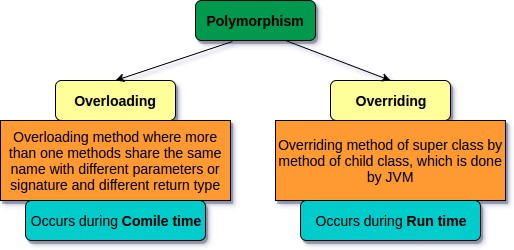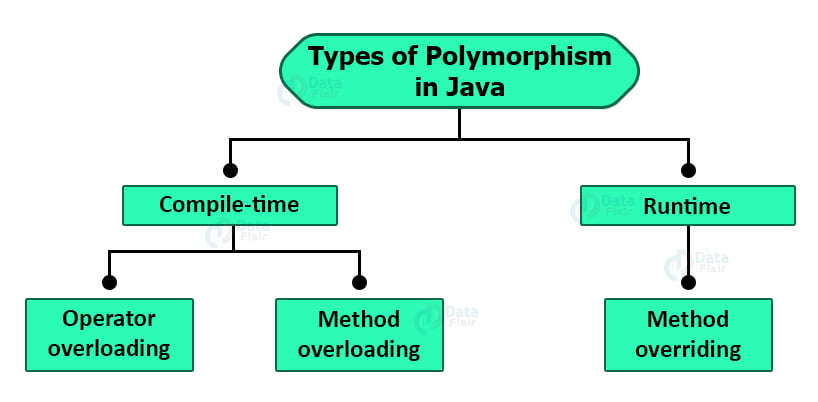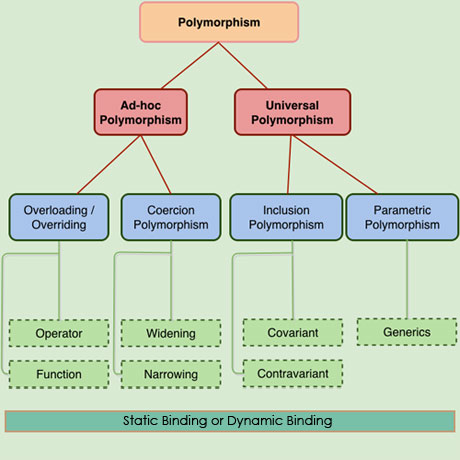Explain the Different Forms of Polymorphism in Java
Like we specified in the previous chapter. Compile-time polymorphism is the type of polymorphism occurs when.

What Is Polymorphism In Java Tutorial With Examples
Compile-time Polymorphism Runtime Polymorphism.

. This principle can also be applied to object-oriented programming and languages like the Java language. Polymorphism uses those methods to perform different tasks. Next we will learn about the different types of Polymorphism in Java.
Below are the different types of polymorphism in java. 1 Static Polymorphism also known as compile time polymorphism 2 Dynamic Polymorphism also known as runtime polymorphism. Polymorphism in Java is closely associated with the principle of inheritance.
Method Overloading in Java This is an example of compile time or static polymorphism 2. Polymorphism in Java is a concept by which we can perform a single action in different ways. Polymorphism is a feature of the object-oriented programming language Java which allows a single task to.
The most common use of polymorphism in OOP occurs when a parent class reference is used to refer to a child class object. There are two types of polymorphism in java. When we overload a static method we call it as static polymorphism.
The dictionary definition of polymorphism refers to a principle in biology in which an organism or species can have many different forms or stages. To simply put polymorphism in java allows us to perform the same action in many different ways. Subclasses of a class can define their own unique behaviors and yet share some of the same functionality of the parent class.
This article is a attempt to explore the concept. Any Java object that can pass more than one IS. Method Overriding in Java This is an example of runtime time or dynamic polymorphism 3.
Polymorphism in Java is the ability of an object to take many forms. Polymorphism in Java simplifies programming by providing a single interface overlaid with multiple meanings as it goes through the rigor of subclassing. Generics were added to the language in version 50.
There are two types of polymorphism one is Compile time polymorphism and the other is run time polymorphism. Since it resolves the polymorphism during compile time we can call also name it as compile-time polymorphism. This allows us to perform a single action in different ways.
In this guide we will see types of polymorphism. The term polymorphic means having multiple forms. There are two different types of Polymorphism in Java.
Coercion is an operation that serves multiple types through implicit-type conversion. Polymorphism means many forms and it occurs when we have many classes that are related to each other by inheritance. How does Java implement polymorphism.
Inheritance lets us inherit attributes and methods from another class. The print method is also an example of polymorphism. We can implement this type of polymorphism in java using either method overloading or operator overloading.
What is polymorphism explain use of polymorphism in Java programming. Compile time polymorphism static binding and Runtime polymorphism dynamic binding. Types of polymorphism and method overloading overriding are covered in the separate tutorials.
So polymorphism means many forms. The word poly means many and morphs means forms. Compile time polymorphism is method overloading.
To solve this polymorphism in Java allows us to create a single method render that will behave differently for different shapes. It relates to method overloading. In Java polymorphism is mainly divided into two types.
Polymorphism is the ability of different objects to respond in a unique way to the same message. When the compiler is able to determine the actual function its called compile-time polymorphism. Static or compile-time polymorphism.
Java implements polymorphism in two ways. They were designed to extend Javas type system to allow a type or method to operate on objects of various types while providing compile-time type safety. Compile time Polymorphism or Static polymorphism Polymorphism that is resolved during compiler time is known as static polymorphism.
There are two types of compile-time polymorphism. A typical Java program encounters Compile-Time Polymorphism during the compilation stage. Runtime time polymorphism is done using inheritance and interface.
Polymorphism is derived from 2 Greek words. Polymorphism is the ability of a programming language to present the same interface for several different underlying data types. You can refer them here.
Static Polymorphism in Java is a type of polymorphism that collects the information for calling a method at compilation time whereas Dynamic Polymorphism is a type of polymorphism that collects the information for calling a method at runtime. Types of Polymorphism 1. It is used to print values of different types like char int string etc.
Compile-time polymorphism and runtime polymorphism. Polymorphism is the ability of an object to take on many forms. Parameteric polymorphism is achieved through generics in Java.
Basically a generic form of a class or method can have all of its types replaced. There are two types of polymorphism in Java. Types of polymorphism in Java There are four types of polymorphism in Java.
Polymorphism in Java has two types. From a practical programming viewpoint polymorphism manifests itself in three distinct forms in Java. Java supports polymorphism and it can be divided into two types.

Polymorphism In Java Master The Concept In Just 7 Mins Dataflair

Java Tutorial Polymorphism In Java Java Polymorphism Learntek Org


No comments for "Explain the Different Forms of Polymorphism in Java"
Post a Comment